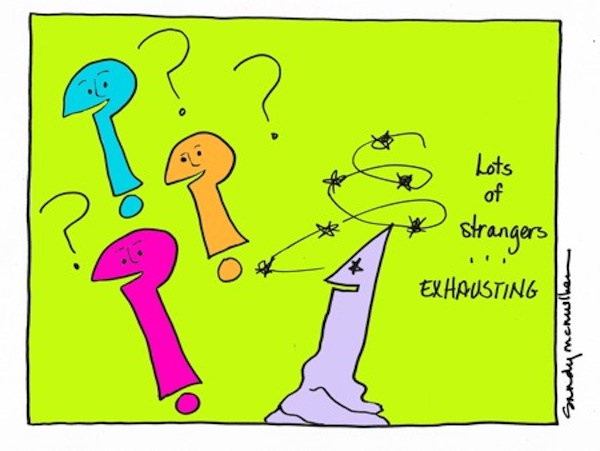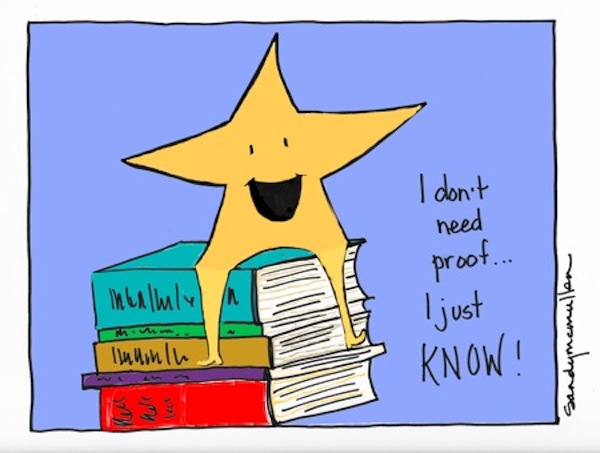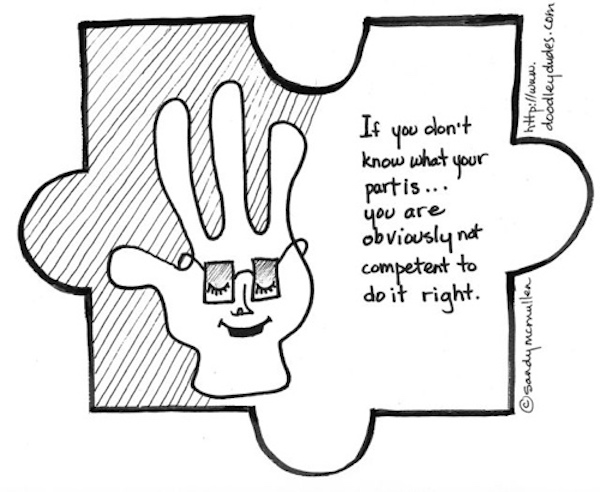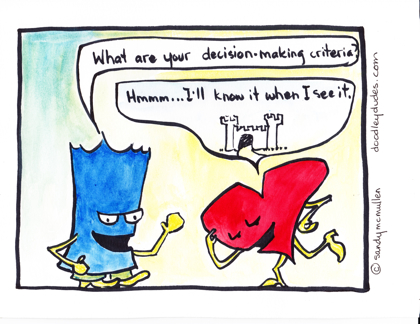
by Sandy | Mar 3, 2018 | MBTI Facts
Networking – you either love it or you don’t.
Some groups seem friendlier and less threatening than others.
Even though I have a preference for Extraversion I have an aversion to networking, but perhaps that is obvious in the tone of this post.
It is hard enough to explain my passions to people who know me well, but a roomful of strangers is daunting.
I understand that those with a preference for Introversion can be both competent and capable when it comes to networking. I can just imagine that a room full of strangers could result in an energy draining experience for many Introverts.

by Sandy | Feb 27, 2018 | MBTI Facts
When you ask someone with a preference for Intuition how they came to understand something to be true for them, they can come up with a logical rational explanation. If truth be told they often just know. Different threads come together so that those who prefer Intuition SEE the pattern and it all becomes clear. Then they seek to back it up with some rationale.
Those who are versed in developing critical thinking skills in decision making, may find relying on Intuition unreliable. I use my Intuition all the time. I also trust that I can distinguish when it is the kind of decision where it is necessary to take a more refined look weighing what I believe against critical criteria.
The thing is my Intuition has been a reliable guide at least 90% of the time.
How do I know that’s true – you may ask? I just know.

by Sandy | Feb 25, 2018 | Enneagram, MBTI Facts, Reiss Motivation Profile
Here is a question I received about reactions to needy people. Perhaps this also strikes a chord with you?
I run like crazy away from people that I see as needy or clingy. It’s top of mind right now because I went on a date last night and decided that the guy was insecure and needy and would need a lot of “coddling” and “taking care of”, and I thought, “I’m out of here; I so don’t want to do that for someone.”
But then I thought that when I have been in relationships – with guys that didn’t come across as needy – I *love* taking care of them. I go out of my way to do nice things and look out for them. But they need to not need it in order for me to want to do it.
I’ve noticed this in work contexts too – I don’t like working with people if I get a needy feeling from them; in fact, the more they say they need me the more I withdraw.
Any Enneagram 5 or INTJ/INFJ light that you would like to shed on this?
Since this reaction to needy people has also come up for me, I am curious to have a l look at what might be happening.
Through the lens of the MBTI
What first came to mind was the possible reaction that someone with a preference for Thinking might have toward someone with a preference for Feeling. For the Thinking type decision making is made through objective analysis and the more internal process of the Feeling preference can seem slow, inefficient, unreliable or illogical which could be interpreted as being “needy”.
People who may have a preference for Feeling but are out-of-preference on one or two aspects might also react in a similar fashion. My out-of preference for the Tough side of the Tough-Tender aspect of Thinking-Feeling has made some people’s “weighing all aspects” time consuming process seem exasperatingly slow and “bleeding-heart” . I avoid “needy” people because my fear is that they won’t stand on their own two feet and make the decisions that are necessary to make for themselves.
Through the lens of the Enneagram
I am wondering if some of this reaction is due to the level of development of the person. Any type who is unhealthy can elicit red flags warning us to steer clear. Riso and Hudson have done a wonderful job in describing the healthy and unhealthy states for each type.
The Enneagram Five is the type most likely to have radar that would signal that a needy person would impinge on their peace of mind. Feelings and emotion interfere with the Fives detached observer stance and is the number one thing to be avoided.
The Enneagram Eight would have a more assertive reaction to the needy person. Rather than withdrawing and avoiding them they would deal with someone who wasn’t willing to stand up and try in a direct manner. While an underdog who is willing to fight for themselves is championed, anyone who clings and shows their belly might be told to “Get a life.”
Each type would react differently to people perceived as being needy and I am curious about how people of other types react. It would be great to hear your perspective.
Through the lens of the Reiss Desire Profile
When I was pondering my response to this query, the insights from the Reiss Desire Profile leapt to mind. Three of the 16 basic psychological needs might each have some influence here: the need for Acceptance, the need for Independence and the need for Social Contact.
The need for Acceptance relates to the need for approval. Anyone with a high need in this area can be seen as being needy. If you happen to have this as a need, you will never succeed in making it disappear. What you can do is recognize and accept it and design ways to get this need filled. Part of the trouble comes when people expect others in their inner circle, at work or random contacts to accommodate this need instead of being intentional in getting it met.
How does one do that? I’m not sure what would work for any individual but perhaps an example will help get the wheels turning. Mary Kay Cosmetics in the hay day of building their organization gave away pink Cadillacs plus many other public ways of showing recognition in a culture based on Acceptance. If someone can get their need met in one aspect of their life they will not have to generalize it to every situation.
Imagine that you are someone with a low need for Acceptance, a high need for Independence and a low need for Social Contact… if this profile or any combination of these desires fits you think about how you typically react to needy people.
What if we could use the information we glean from assessment tools to shift our reactions from personal to objective, we might reduce the temptation to judge or blame and instead get curious about what we can learn about how to work with people of all levels and types of needs.

by Sandy | Feb 23, 2018 | MBTI Facts
This MBTI based cartoon is based on a direct quote from an ISTJ. I love the word “obviously” smack in the middle of this summation. I can imagine someone who knows what their place is in the organizational structure and abides by all of the spoken and unspoken traditions that accompany the org chart. Efficient, orderly, organized and a strong dose of being realistic. The job at hand gets done – fun, frivolity and spontaneity may not be in the job description here.

by Sandy | Feb 21, 2018 | MBTI Facts
Palliative care takes a special kind of person. Imagine stepping into this role with someone in your social circle.
Recently I spoke with a woman who commented that she had just come from the last visit with a woman who she had been caring for for the last 6 months. That wasn’t her career and she hadn’t even started out as a best friend, but here she was saying goodbye to someone important in her life.
Granted she had skills that allowed her to do this work as a caregiver. She had been a nurse and is a trained coach working in the education system with families. However what was amazing to me was the combination of practicality and compassion that went hand in hand in her approach.
Understandably the family of the woman who was dying were in a state of confusion and denial. Part of what this ESFJ offered to them was being able to see through the overwhelm to know what needed to be done not only in the moment but for the next steps. The suggestions she made provided organized, well thought through information with concrete steps that were easily achievable. The family came to trust her open and compassionate guidance. Plus it gave them something to do to feel somewhat in control.
ESFJ’s supply warmth and are a steadying influence. They work well in systems and/or teams as they create collaborative environments where the practical needs of all concerned are top of mind.
What was most evident to me was the value in the simple act of daily conversation. These two women talked from the heart about what was wanting to be said…no holding back…no being afraid to go to all of the scary places.
Perhaps other types can also bring this level of heart and hand but this ESFJ has my vote for getting her angel wings.

by Sandy | Feb 20, 2018 | MBTI Facts
What is the logical rational first thing that needs to happen when you are making a significant life or business decision? If you have a preference for Thinking, your answer to this question might just be that you need to identify your criteria for a successful outcome. That way you will be able to compare and decide if the option before you meets that criteria.
While this makes sense in theory, in practice someone with a preference for Feeling will typically have a different approach. They may eventually come up with a very rational and objective set of criteria but a more subjective approach will lead them there.






